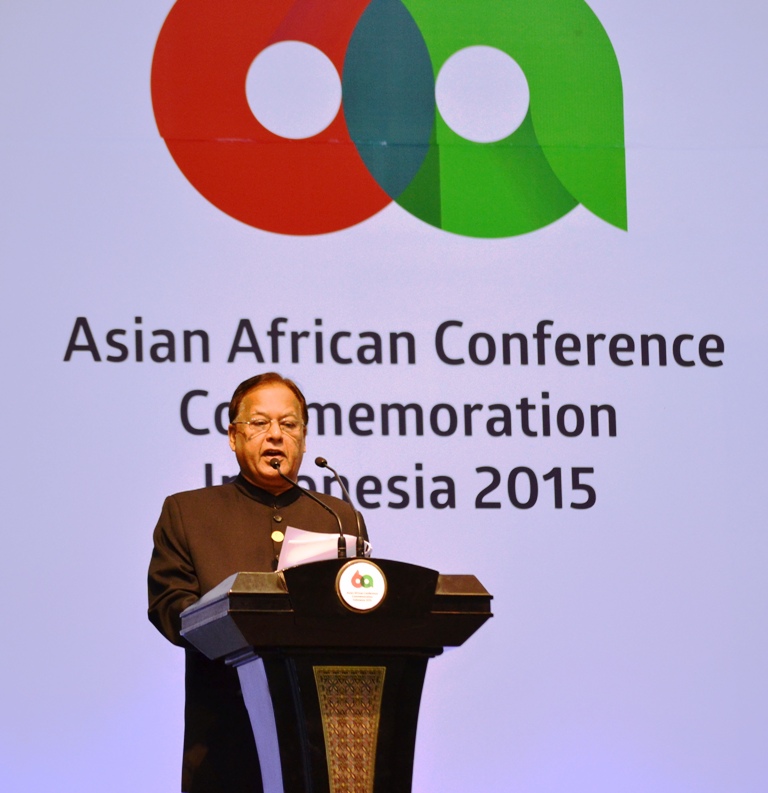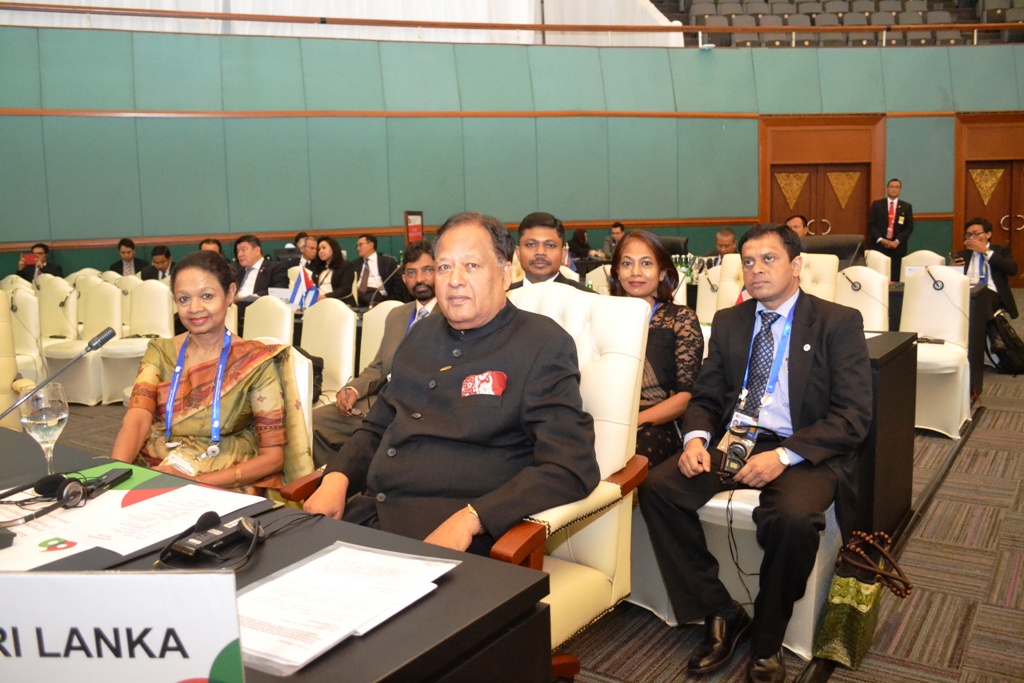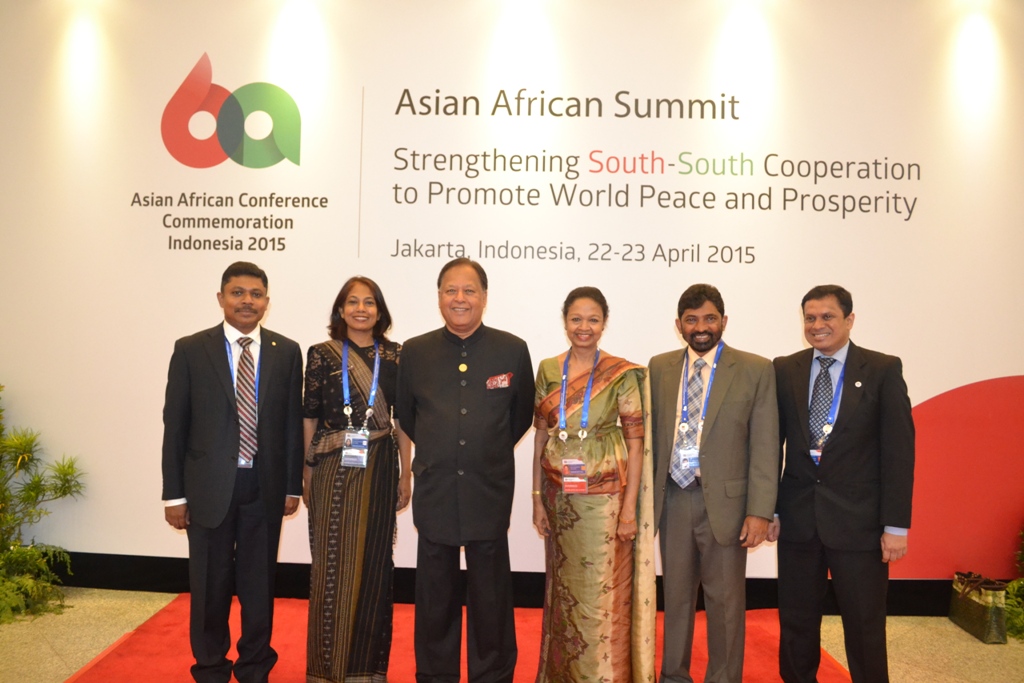
The Minister of Higher Education and Research Dr. Sarath Amunugama, who led the Sri Lanka delegation to the Asian-African Leaders Summit in Jakarta, Indonesia, as the Special Envoy of President Maithripala Sirisena, has stressed the importance of revitalizing Asian-African cooperation to further advance cross-regional and trade and investment between the two continents. He made this call while addressing the Leaders Summit in Jakarta yesterday (23 April 2015) to mark the 60th anniversary of the historic Asian-African Conference held in Bandung in April 1955.
It was in
Speaking further at the
He stressed the importance of innovative and concerted action to address the complex challenges facing countries in an increasingly inter- connected and globalized world. Highlighting the need for more resources to improve the lives of the people in the two continents, Minister Amunugama advocated a robust role for the private sectors in the two regions to further advance cross-regional trade and investment flows. In this context, the Special Envoy of the President said that it was timely and appropriate that due recognition has been given to the vast potential for enhancing Asian-African cooperation and partnership in the maritime sector, especially between the Indian and Pacific Oceans.
At the multilateral level, Minister Amunugama called for the two regions to cooperate to ensure that the process of intergovernmental negotiations on the Post-2015 Development Agenda remained transparent and inclusive under the auspices of the United Nations.
The


Embassy of
Full text of the Minister’s Statement is below.
Statement by the Special Envoy of the President and Minister of Higher Education and Research Hon. Sarath Amunugama at the Asian-African Leaders Summit of the 60th Anniversary Commemoration of the Asia-Africa Bandung Conference of 1955, 23rd April 2015, Jakarta, Indonesia
Distinguished Co-Chairs
Majesties,
Excellencies,
Distinguished delegates,
Sri Lanka greatly values this opportunity to participate in the 60th anniversary commemoration of the Asian-African Bandung Conference of 1955. It is indeed a unique honour for my country, which was among the five co-hosts of the 1955 Conference.
I join other delegations in thanking President Joko Widodo and the Government of Indonesia for the warm and generous hospitality extended to our delegation and excellent arrangements made for this Summit.
Sri Lanka is proud that it was at the Colombo Powers Conference in April 1954 that the Prime Ministers of Burma (Myanmar), Ceylon (Sri Lanka), India, Indonesia and Pakistan met and decided to convene the Asian - African Conference in Bandung in 1955. All of us worked hard to make that meeting a success.
The leaders who spearheaded the Bandung Conference were bold and visionary. As newly independent countries with under-developed economies and little political clout, there was an abundance of moral courage, intellectual and political zest to mobilize the nascent spirit of Asian - African solidarity to articulate an alternative vision for international peace and prosperity. The Asian - African Bandung Conference of 1955 amplified our collective voice and visibility in the global arena. The ‘Spirit of Bandung’ and the ten principles enunciated at the 1955 Conference crystallized later into the Non-Aligned Movement, of which Sri Lanka was one of the 25 founder members.
Many of the challenges and crises we confront today are complex and in many ways interconnected. Whether it is Climate Change, global economic uncertainty induced by the financial crisis, terrorism and transnational organized crime, internal armed conflicts, epidemics or pandemics, their consequences are far-reaching globally. Given the increasingly challenging environment we navigate today, our responses to such challenges require concerted and often innovative action. In meeting such challenges, we need to ensure that our place at the multilateral and international negotiating table is secure and strong. We must also work together to ensure that the principles enshrined in the Charter of the United Nations are upheld and multilateral mechanisms that have been established are utilized for the greater good. Therefore, the theme of this Summit, “Strengthening South-South Cooperation to promote world peace and prosperity” is very appropriate and timely.
The Declaration on the New Asian - African Strategic Partnership of 2005 provides a blueprint for Asian - African collaboration to address poverty and underdevelopment, among other issues. Our two continents are home to 75% of the world’s population and account for 30% of global
Some of our fellow countries have already attained economic indicators comparable to economies of the North. However, the vast potential for inter - and intra-regional trade remains underutilized. It is necessary that we address through South – South cooperation asymmetries and bottlenecks, including poor connectivity and infrastructure, impeding investment and trade flows between our two continents. It is commendable that we support the role the private sectors in the two regions and a network of Asian - African think-tanks could play to further advance cross-regional trade and investment. We have also given timely recognition to the vast potential for advancing Asian-African cooperation and partnership in the maritime sector, especially between the Indian and Pacific Oceans. Excellency, with Indonesia taking over the Chairmanship of the Indian Ocean Rim Association (IORA) later this year, there is vast scope for utilizing and leveraging the synergies of the activities under IORA’s six priority areas with activities and approaches that we envision under Asian-African maritime cooperation.
While we seek to strengthen our economies and increase our contribution to the global
All our countries are in need of more resources to improve the lives of our people. It has been estimated that several trillions of dollars are necessary for infrastructure development in the Asian – African countries. We must cooperate to ensure that we receive our entitlements from the international financial institutions. We welcome the initiative of China to establish the Asian Infrastructure Investment Bank.
All the leaders represented here have pledged to lift our people out of poverty. Poverty is a curse on mankind and it is our responsibility to ensure that our marginalized poor are given a new deal so that their lives are made more comfortable and meaningful.
The best way to do so is to improve livelihood chances of the underprivileged. For this our economies must be modernized and made more productive.
At the multilateral level, our two regions must cooperate to ensure that the process of intergovernmental negotiations on the Post - 2015 Development Agenda remains transparent and inclusive under the United Nations. The process to be effective, we need to necessarily recognize and provide the policy, space and ownership to the countries to identify their development priorities based on their peoples’ needs. Clearly defined means of implementation, including the accessibility to resources and transfer of technology are integral to the successful implementation of the SDGs and other outcomes of inter-governmental processes on the Post 2015 Development Agenda.
Under South–South Cooperation, we need to evolve common positions on negotiations related to Climate Change. The magnitude of the devastation caused to Vanuatu’s infrastructure and development in the wake of Cyclone Pam, is a tragic reminder of the need for concerted global action to address the impact of climate change, which also needs to be addressed multi-dimensionally and collectively, and not only from an environmental standpoint, but also from the social, economic and security perspectives.
The one sad constant in the annals of the 1955 Conference and its aftermath, is the predicament of the Palestinian people. We urge the Government of Israel and the Palestine National Authority to utilise the existing international goodwill to facilitate the Peace Process, which we must frankly admit is moribund. The cost of failing to reach a just and permanent peace accord is too high for the countries concerned as well as the region and beyond. Cessation of settlement activities in the occupied territories and ending the Gaza blockade, are important aspects that must be addressed urgently, while respecting the security needs of the people of Israel. These are important confidence building measures, which could serve to kick-start the Peace Process.
Sri Lanka supports a negotiated solution, resulting in a sovereign, independent, viable and united State of Palestine with East Jerusalem as its capital, existing within secure and internationally recognized borders side by side and at peace with the State of Israel, as endorsed in the Arab Peace Initiative, the Quartet Roadmap and the relevant UN Security Council resolutions. Sri Lanka also supports Palestine’s application for admission to full membership in the United Nations. We hope that every effort will be made this year to lay the groundwork for advancement of the Peace Process on these parameters.
I recall the title of President Sukarno’s opening speech at the Bandung Conference in 1955, “Let a New Asia and a New Africa be born.” There is no doubt that Indonesia’s leadership in setting up the Asian - African Centre in Bandung, declaring 24th April each year as the Asian - African Day and Bandung, as the historic capital of Asian – African solidarity, will be a significant contribution towards a new awakening.
As our world becomes more interconnected and we collectively navigate through our shared challenges, the “Bandung Spirit” will continue to strengthen and inspire us.
I thank you.




